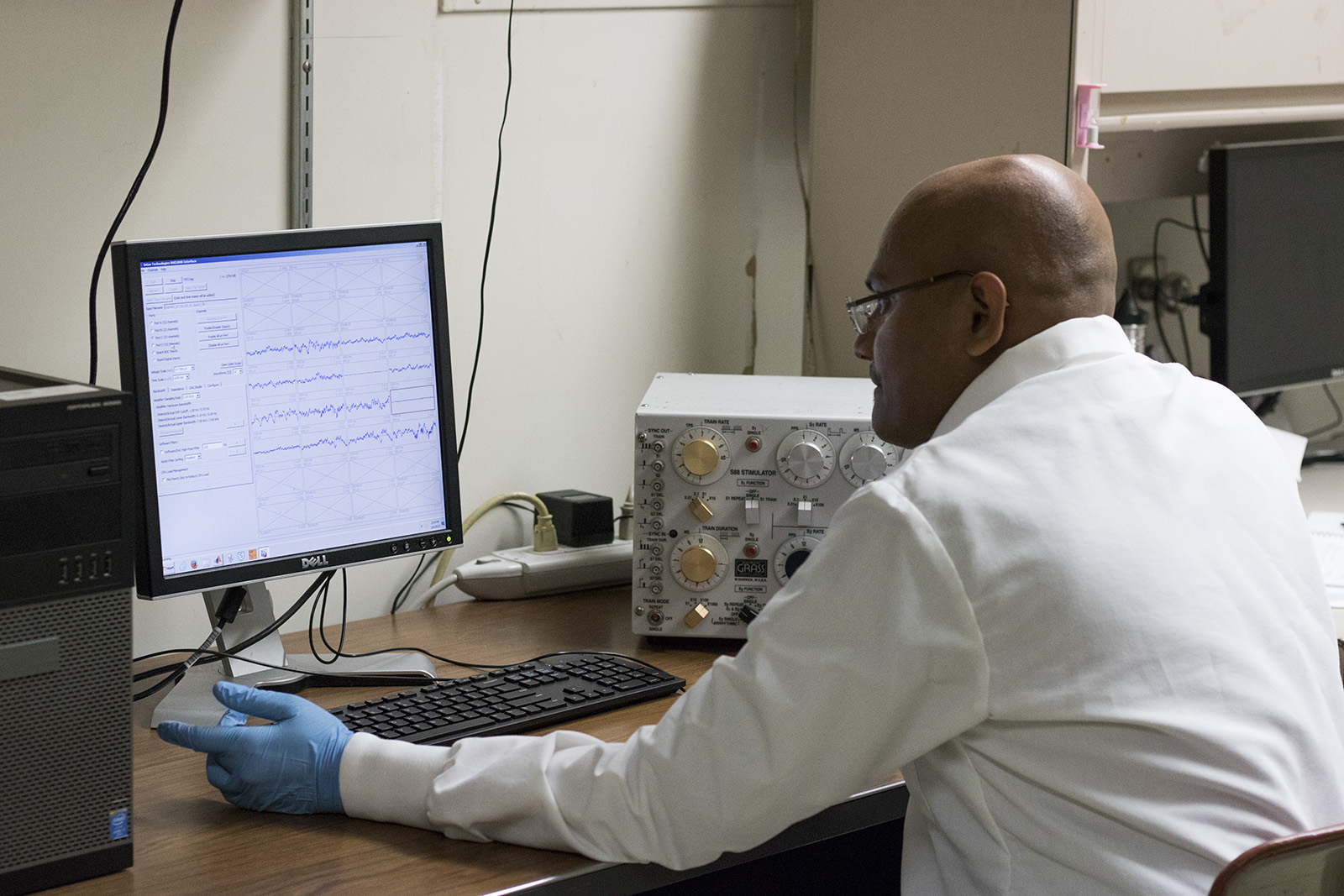UCLA researchers receive grant to study potential epilepsy treatments

Udaya Kumar, a postdoctoral researcher working with neurology professor Richard Staba, monitors and analyzes the electrical brain activity of lab animals. (Frank To/Daily Bruin)
By Xinchen Li
Feb. 8, 2017 10:25 p.m.
A UCLA-led international research team received a $21-million grant last month to advance treatment for epilepsy.
The grant will allow UCLA researchers to study potential preventive therapies for epilepsy caused by traumatic brain injury. If the project succeeds, UCLA could be the first to develop preventive epilepsy therapy available for wide use.
Epilepsy, which may result from a number of different injuries, is a brain nerve disorder that leads to unpredictable seizures throughout a person’s lifetime.
“Epilepsy is one of the primary brain diseases,” said Jerome Engel, director of the project and a neurology, neurobiology and psychiatry, and biobehavioral sciences professor.
Engel said that of all diseases, epilepsy accounts for 1 percent of lifetime loss globally, about the same loss of life that breast cancer causes in women.
“But as such a serious disease, epilepsy is underfunded and underappreciated,” Engel added.
Engel also said epilepsy patients are sometimes stigmatized, leading them to hide their diseases from others.
[Throwback: UCLA’s Dr. Gary Mathern gives children with untreatable seizures a second shot at a normal life]
Because there is less media coverage and public knowledge of epilepsy, research on epilepsy also tends to receive less funding compared to other diseases, he added.
The epilepsy research team will involve research institutions and clinical centers from different countries such as Australia and Finland, Engel said. UCLA started collaborating with the institutions on epilepsy research more than four years ago.
The team submitted a research proposal to the National Institutes of Health about one year ago, Engel said. They won the five-year grant among several other international research teams.
The causes of epilepsy are diverse, but it is hard to predict when a patient will develop epilepsy after a brain injury, Engel said. Currently, common treatments of epilepsy include anti-seizure drugs and surgeries.
“All these treatments are Band-Aids,” Engel said. “There has not been a good way to prevent or to completely cure epilepsy.”
The research project aims to find a way to test potential preventive therapies, Engel said. The key to the study is finding the biomarkers that indicate how likely a patient will develop epilepsy after experiencing traumatic brain injury.
Engel said the team is investigating traumatic brain injury because the timing of the injury is definite, so it offers the best opportunity to examine how epilepsy develops.
Investigators will examine the blood samples and brain electrical activities of 300 patients to identify the biomarkers most associated with epilepsy, said Paul Vespa, one of the study’s principal investigators and a neurosurgery and neurology professor.
After identifying the potential biomarkers, researchers will examine the same biomarkers in animals and determine which ones have the most significant response when epilepsy develops, said Richard Staba, a neurology professor and leader of the preclinical experiments.
Further studies will test the effectiveness of different drugs and interventions on animals based on these biomarkers, Staba said. Researchers hope to find the most precise treatment for epilepsy.
“The strength of this project is it examines similar types of data in both clinical and preclinical experiments,” Staba said. “We hope each can inform the other.”
Staba added different institutions involved in the project will operate parallel experiments in their local communities and share their data.
He also said the parallel studies will eliminate particularity of each trial and result in more universal results. Investigators will borrow from each other’s experience to improve the research methodology.
Researchers also aim to attract more public engagement, Vespa said. The team will collaborate with patient advocacy organizations, such as Epilepsy Foundation, a nonprofit foundation that helps epilepsy patients participate in normal life experiences.
Through the advocacy organizations, researchers will provide patients and their families with information about the clinical and psychological assistance available to them, Vespa said.
“Patients who have suffered from traumatic brain injuries are sometimes ashamed of their diseases,” Vespa said. “They also don’t know who to turn (to) for help.”
Vespa said the organizations will also collect feedback from patients on whether these treatments are effective. The information will help investigators improve the treatments accordingly.
“We not only want to keep the patients engaged,” Vespa said. “We also want to advocate for them.”
Engel added he hopes to reach a major milestone for the project in five years.
“We hope by the end of five years, we will have enough information to carry out at least one randomized controlled clinical trial of at least one anti-seizure treatment for epilepsy,” Engel said.


